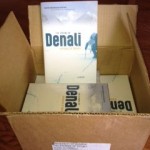 The book as physical object. Though the number of electronic books continues to grow, there’s nothing quite like a book with an appealing cover design, elegant type and tempting jacket copy. With the explosion in growth of electronic books, such details are increasingly being lost. That’s why I so enjoyed receiving in the mail a stack of my new novel, The Storms of Denali. Yes, the carton was heavy, the postage was expensive, but turning the book over in my hands, the smell, feel, and tactile sensation of it was pure pleasure.
The book as physical object. Though the number of electronic books continues to grow, there’s nothing quite like a book with an appealing cover design, elegant type and tempting jacket copy. With the explosion in growth of electronic books, such details are increasingly being lost. That’s why I so enjoyed receiving in the mail a stack of my new novel, The Storms of Denali. Yes, the carton was heavy, the postage was expensive, but turning the book over in my hands, the smell, feel, and tactile sensation of it was pure pleasure.
For an author, the physical book is a proof that your idea, your world, your characters have become real. Authors can tend to doubt this will ever happen, especially after working for years on a project as I did on the novel, wondering if the words will ever reach a larger audience. The physical book is proof that they will. The Storms of Denali will be out to bookstores within the next few weeks.
Readers benefit as a well-designed book enhances the pleasure and experience of reading, turning the pages with your fingers, working back and forth to take in all the details and insights and appeal of the manuscript.
I have nothing against digital books. I read them myself, but when it comes to a work I really want to devour, nothing beats the actual, physical, tree -sacrificed paper pages of a book.
Nicholas O’Connell, M.F.A, Ph.D., is the author of the forthcoming The Storms of Denali (U of Alaska and U of Chicago presses), On Sacred Ground: The Spirit of Place in Pacific Northwest Literature (U.W. Press, 2003), At the Field’s End: Interviews with 22 Pacific Northwest Writers (U.W. Press, 1998), Contemporary Ecofiction (Charles Scribner’s, 1996) and Beyond Risk: Conversations with Climbers (Mountaineers, 1993). He contributes to Newsweek, Gourmet, Saveur, Outside, GO, National Geographic Adventure, Condé Nast Traveler, Food & Wine, The New York Times, The Wall Street Journal, Sierra, The Wine Spectator, Commonweal, Image and many other places. He is the publisher/editor of The Writer’s Workshop Review and the founder of the online and Seattle-based writing program, www.thewritersworkshop.net.